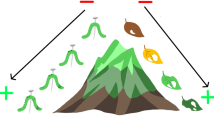Abstract
MICROBIAL communities contain a wide variety of microorganisms living together, frequently at high population densities. These communities are relatively stable and not easily disturbed. When a heterogeneous animal or plant population becomes unbalanced by a minor ecological disturbance, such as immigration of a foreign species or by a temporary change in nutrient concentration, the community structure may be altered permanently. By contrast, microbial populations developed either by intrusion of non-indigenous microorganisms or by temporary ecological perturbations are vigorously resisted by the native community. Intermicrobial predators exist in most microbial communities. This communication describes the homeostatic processes by which microbial imbalances are reversed by predators among the native population.
Similar content being viewed by others
References
Mitchell, R., Yankofsky, S., and Jannasch, H. W., Nature, 215, 891 (1967).
Mitchell, R., and Wirsen, C., J. Gen. Microbiol., 52, 335 (1968).
Canter, H. M., and Lund, J. W. G., New Phytol., 37, 238 (1948).
Mitchell, R., and Jannasch, H. W., Env. Sci. Technol., 3, 941 (1969).
Author information
Authors and Affiliations
Rights and permissions
About this article
Cite this article
MITCHELL, R. Role of Predators in the Reversal of Imbalances in Microbial Ecosystems. Nature 230, 257–258 (1971). https://doi.org/10.1038/230257a0
Received:
Revised:
Issue Date:
DOI: https://doi.org/10.1038/230257a0
- Springer Nature Limited
This article is cited by
-
Viability of Salmonella spp and indicator microorganisms in seawater using membrane diffusion chambers
Antonie van Leeuwenhoek (1990)
-
Effects of a clay mineral on microbial predation and parasitism ofEscherichia coli
Microbial Ecology (1977)
-
Petroleum hydrocarbons inhibit decomposition of organic matter in seawater
Nature (1976)
-
Inhibition of inter-microbial predation by chlorinated hydrocarbons
Nature (1974)
-
Modification of the interaction betweenEscherichia coli and bacteriophage in saline sediment
Microbial Ecology (1974)





